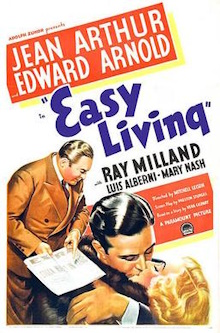The thing with these very old Hollywood films is that even if they’re not much good, at least they’ll be easy to watch and understand. This Depression-era film certainly qualifies as being the latter and taking into account the quality of storytelling of the time, I think it’s not altogether bad either. What aged the most is the slapstick humor as hitting people or seeing them fall down just isn’t very funny these days. The story about a working class girl skyrocketing to the luxurious heights of the high life is straight out fairy tale material, but perfect exemplifies the escapist fantasy of the period. It may not be a great film, but it’s quite fun!
The third richest banker in America J.B. Ball is frustrated by his son John Jr.’s lack of independence, and his wife Jenny’s overspending. After arguing with Jenny over a $58,000 sable coat, he throws the coat over the side of their New York penthouse. It falls on top of the head of Mary Smith, a lowly clerk, as she is riding the bus to work. She tries to return the coat but J.B. Ball tells her to keep it. He even takes her to work in his chauffeured car and stops to buy her a new hat because her old one was damaged. This leads the owner of the shop to believe that she is the banker’s mistress. He leaks this news to Louis Louis, the owner of a luxury hotel that is failing and is behind on his mortgage to J.B. Ball. Mary is fired when she turns up for work in an expensive fur coat and doesn’t even have enough money to eat. Louis installs her in his most expensive suite, believing that J.B. Ball would not be heartless enough to foreclose on him then. She also starts receiving all kinds of gifts from people who want J.B. Ball’s favor. One night while she looks for food at an automat, she runs into John Jr. who happens to be working there to prove that he can make it on his own without his father’s wealth.
Every twist and turn of this film is telegraphed well in advance. Even when I didn’t recognize the actor who plays John Jr. when he pops back into the story I knew it had to be him because of course that’s what must happen next. As usual with these things, it’s ridiculous how long they keep up the misunderstanding that Mary is J.B.’s mistress, but it is a lot of fun while it lasts. It’s extra amusing when neither of them know the other’s name but everyone else thinks it’s a nod-nod-wink-wink type of situation. Another scene I liked is when J.B. is trying to educate Mary about how real interest rates are calculated. Yet later it also presents the populist, simplified version of how the stock market works. I hate the slapstick stunts like J.B. falling down the stairs or the customers in the automat repeatedly slipping on food. There’s nothing funny about ordinary people getting hurt in mundane ways. I also dislike how it portrays Jenny into a shrew who cares more about her expensive fur coat than her husband or even her son. They try to redeem the character towards the end with a line about how she’s willing to suffer through tough times with her husband but it’s not worth very much.
The fantasy of an ordinary person just off the street instantly being accepted into the ranks of the rich and famous without having to lift a finger is a common one and this instance of it is more outrageous than most. It’s easier to sympathize with it when you realize that it was made during the Depression, hence the ridiculous scene in the automat when the people are delighted by seemingly free food makes much more sense. The bit about the stock market yoyoing up and down based only on rumor may be an oversimplified caricature but it perfectly tracks the sentiment of the time about how the economy makes no rational sense at all. This film compounds that fantasy further by setting up a romance between Mary and John Jr. That’s exactly as unearned and terrible as it sounds but at least director Mitchell Leisen does us the mercy of not laying it on too thick.
This is in no way a good film but it is watchable and entertaining. I got a kick out of the realizing that one of the jazz standard songs that was recently revived by the Fallout games originated here. It also makes for a good teaching example of how films are tailored to the specific eras they are made in.
